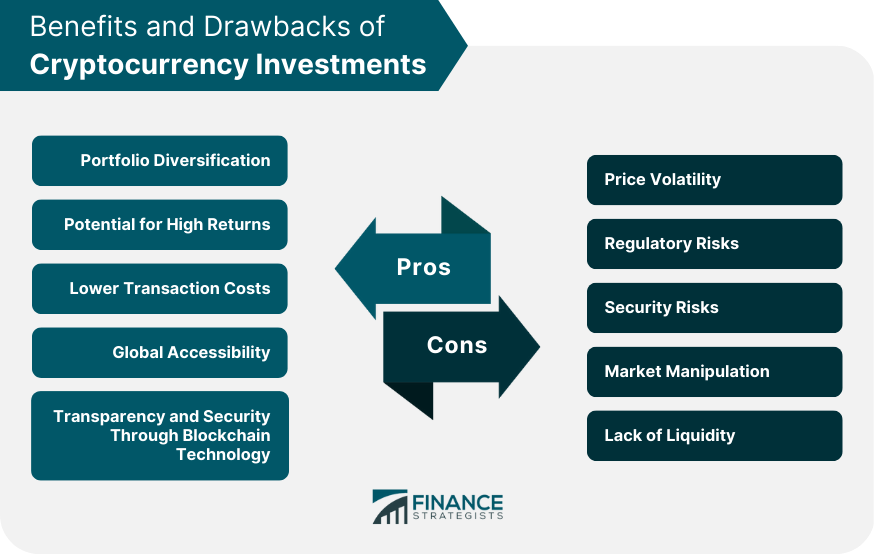Cryptocurrencies play an increasingly important role in the modern investment landscape, offering investors a unique asset class with distinct characteristics, opportunities, and risks. A cryptocurrency is a digital or virtual currency that uses cryptography for security and operates on a decentralized ledger called the blockchain. It is designed to work as a medium of exchange, enabling peer-to-peer transactions without the need for a central authority, such as a bank or government. Since the creation of Bitcoin in 2009, cryptocurrencies have experienced tremendous growth in both value and popularity, attracting the attention of investors worldwide. As a result, cryptocurrencies have become a significant asset class, providing new opportunities for diversification and potential returns. Bitcoin is the first and most well-known cryptocurrency, often referred to as digital gold. It was created by an anonymous individual or group known as Satoshi Nakamoto and has a capped supply of 21 million coins. Ethereum is the second-largest cryptocurrency by market capitalization, providing a platform for decentralized applications (dApps) and smart contracts, which are self-executing contracts with the terms of the agreement directly written into code. Ripple, or XRP, is a cryptocurrency designed to facilitate fast and low-cost cross-border transactions. Its primary focus is on providing financial institutions with an efficient means of transferring value across borders. Litecoin is a cryptocurrency that was created as a lighter and faster alternative to Bitcoin. It has a faster block generation time, allowing for quicker transaction confirmation. Cardano is a blockchain platform that aims to provide a more secure and scalable infrastructure for the development of dApps and smart contracts. Its native cryptocurrency, ADA, is used to facilitate transactions on the platform. Altcoins are alternative cryptocurrencies to Bitcoin, with thousands of different coins available, each offering unique features and targeting specific use cases or industries. Investors can purchase cryptocurrencies directly through exchanges or peer-to-peer platforms and hold them in their digital wallets. This approach is suitable for long-term investors who believe in the future growth and adoption of cryptocurrencies. Trading cryptocurrencies involves buying and selling coins on various exchanges, aiming to profit from price fluctuations. This approach requires a deeper understanding of market trends and technical analysis. Cryptocurrency funds are pooled investment vehicles that hold a diversified portfolio of cryptocurrencies, providing investors with exposure to the asset class without the need to manage individual investments. Exchange-traded products, such as exchange-traded funds (ETFs) and exchange-traded notes (ETsN), offer investors exposure to the performance of a specific cryptocurrency or a basket of cryptocurrencies, allowing for easy trading on traditional stock exchanges. Investing in companies involved in the development or adoption of blockchain technology, such as chipmakers, exchanges, or mining companies, can provide indirect exposure to the growth of cryptocurrencies. Futures and options are derivative instruments that allow investors to speculate on the future price movements of cryptocurrencies or hedge existing positions, providing additional tools for risk management and trading strategies. Hot wallets are connected to the internet, allowing for easy access and management of cryptocurrency holdings. However, they can be more susceptible to security risks, such as hacking and malware. Cold wallets are offline storage solutions for cryptocurrencies, providing enhanced security by keeping private keys away from internet access. Examples of cold wallets include hardware wallets and paper wallets. Centralized exchanges act as intermediaries between buyers and sellers of cryptocurrencies, offering a platform for trading, storing, and managing digital assets. They typically provide higher liquidity and ease of use but may be more vulnerable to security breaches. Decentralized exchanges (DEX) facilitate peer-to-peer cryptocurrency trading without a central authority, relying on blockchain technology to ensure transparency and security. DEXs can offer increased privacy and control over assets but may have lower liquidity and more complex user interfaces. Cryptocurrencies can provide investors with diversification benefits due to their low correlation with traditional asset classes, such as stocks and bonds. Cryptocurrencies have the potential for high returns, as seen by the historical performance of coins like Bitcoin and Ethereum. However, past performance is not indicative of future results. Cryptocurrency transactions typically have lower fees compared to traditional banking and financial services, providing cost-saving benefits for investors. Cryptocurrencies can be accessed and traded globally, allowing investors to participate in the market from anywhere with an internet connection. Blockchain technology provides transparency and security for cryptocurrency transactions, ensuring that all transactions are recorded and verified on a public ledger. Cryptocurrencies are known for their high price volatility, which can lead to significant fluctuations in value over short periods. This volatility can present both opportunities and risks for investors. As the regulatory environment surrounding cryptocurrencies continues to evolve, changes in laws and regulations can have a significant impact on the value and adoption of digital assets, posing potential risks to investors. Investing in cryptocurrencies involves various security risks, including hacking, phishing, and other cyber threats, which can result in the loss of digital assets. Cryptocurrency markets are relatively small and less regulated than traditional financial markets, making them more susceptible to manipulation and fraudulent activities. Some cryptocurrencies may have limited liquidity, making it challenging for investors to buy or sell large quantities of assets without impacting the market price. Fundamental analysis involves evaluating the underlying factors that affect the value of a cryptocurrency, such as technology, team, use case, and market demand. Technical analysis involves examining historical price data and using various indicators to identify trends and patterns in cryptocurrency price movements. Investing in a diversified portfolio of cryptocurrencies can help manage risk and increase potential returns by spreading investments across various coins and sectors. Dollar-cost averaging is an investment strategy that involves investing a fixed amount of money at regular intervals, regardless of market conditions, to reduce the impact of volatility on the overall investment. Risk management is crucial for cryptocurrency investing, including setting stop-loss orders, allocating a fixed percentage of the portfolio to digital assets, and maintaining a long-term investment horizon. Cryptocurrency investments are typically subject to capital gains tax, with the specific tax rate depending on factors such as holding period, income level, and jurisdiction. Investors may be required to report their cryptocurrency transactions and holdings to tax authorities, depending on local regulations and thresholds. As cryptocurrencies continue to gain acceptance and adoption, their role in the global financial system is expected to grow, potentially providing increased investment opportunities and returns for investors. Regulatory developments will play a crucial role in shaping the future of cryptocurrency investments, as lawmakers and regulators work to establish frameworks for overseeing the asset class and addressing potential risks. Technological advancements in blockchain and cryptocurrencies will likely drive further innovation and growth in the market, offering new opportunities for investors and businesses alike. Cryptocurrency investments have come a long way since the early days of Bitcoin, becoming an increasingly significant asset class for investors worldwide. As the market continues to evolve, it is essential for investors to stay informed about the latest developments and trends. Investing in cryptocurrencies involves a balance of risks and rewards. While the potential for high returns exists, investors must also navigate price volatility, regulatory uncertainty, and security risks. Implementing sound investment strategies and risk management techniques can help mitigate these risks. Conducting thorough research and due diligence is essential for successful cryptocurrency investing. Investors should carefully evaluate the fundamental factors, technical indicators, and market conditions before making investment decisions. Additionally, staying up-to-date with regulatory developments and industry news can help investors make more informed choices in the dynamic world of cryptocurrency investments.What Are Cryptocurrency Investments?
Types of Cryptocurrencies
Bitcoin
Ethereum
Ripple (XRP)
Litecoin
Cardano
Other Altcoins

Investing in Cryptocurrencies
Direct Investment
Buying and Holding
Trading
Indirect Investment
Cryptocurrency Funds
Exchange-Traded Products (ETPs)
Blockchain Stocks
Futures and Options
Cryptocurrency Wallets and Exchanges
Cryptocurrency Wallets
Hot Wallets
Cold Wallets
Cryptocurrency Exchanges
Centralized Exchanges
Decentralized Exchanges
Benefits of Cryptocurrency Investments
Portfolio Diversification
Potential for High Returns
Lower Transaction Costs
Global Accessibility
Transparency and Security Through Blockchain Technology
Risks and Challenges of Cryptocurrency Investments
Price Volatility
Regulatory Risks
Security Risks
Market Manipulation
Lack of Liquidity
Strategies for Cryptocurrency Investing
Fundamental Analysis
Technical Analysis
Diversification
Dollar-Cost Averaging
Risk Management

Tax Implications of Cryptocurrency Investments
Capital Gains Tax
Reporting Requirements
Future Outlook for Cryptocurrency Investments
Mainstream Adoption
Regulatory Developments
Technological Innovations
Conclusion
Cryptocurrency Investments FAQs
Cryptocurrency investment is the act of buying and holding digital currencies with the expectation of making a profit in the future. Cryptocurrencies are decentralized, digital assets that use cryptography to secure their transactions and control the creation of new units.
Cryptocurrency investment can be risky because the prices of cryptocurrencies are highly volatile and can fluctuate rapidly. However, with proper research, risk management strategies, and diversification, it can be a profitable investment option for those willing to take the risk.
Investing in cryptocurrency can offer various benefits, such as potential high returns, decentralization, anonymity, and transparency. Additionally, cryptocurrency investments can provide investors with portfolio diversification, which can help minimize risk.
There are various cryptocurrency investment strategies, such as long-term holding, swing trading, day trading, and ICO investments. Long-term holding involves buying and holding cryptocurrencies for an extended period, while swing trading involves buying and selling cryptocurrencies over a few days or weeks. Day trading involves buying and selling cryptocurrencies within a day, while ICO investments involve investing in newly launched cryptocurrencies.
Before investing in cryptocurrency, it is crucial to do proper research, understand the technology behind the cryptocurrency, assess the risk involved, and set realistic investment goals. Additionally, it is essential to choose a reputable cryptocurrency exchange, consider the fees involved, and be aware of tax implications.
True Tamplin is a published author, public speaker, CEO of UpDigital, and founder of Finance Strategists.
True is a Certified Educator in Personal Finance (CEPF®), author of The Handy Financial Ratios Guide, a member of the Society for Advancing Business Editing and Writing, contributes to his financial education site, Finance Strategists, and has spoken to various financial communities such as the CFA Institute, as well as university students like his Alma mater, Biola University, where he received a bachelor of science in business and data analytics.
To learn more about True, visit his personal website or view his author profiles on Amazon, Nasdaq and Forbes.











